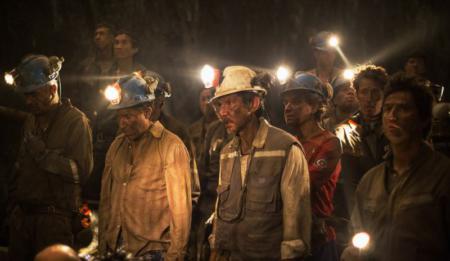The 33
NEW YORK (CNS) -- The real-life story behind the drama "The 33" (Warner Bros.) would seem to provide all the necessary ingredients for a compelling film.
The events on which the picture is based, after all, were sufficiently engaging to grip the attention of the global media and to hold millions around the world in suspense for a time.
As many will remember, in 2010, a catastrophic cave-in at a copper and gold mine in Copiapo, Chile, trapped the titular number of miners underground for an initially terrifying, and subsequently grueling, 69 days. Their Oct. 13 rescue, a triumph of ingenuity achieved against intimidating odds, was witnessed live -- and with fascination -- from Times Square to Tierra del Fuego.
How to explain, then, the disappointing fact that this riveting piece of recent history becomes, under the direction of Patricia Riggen, a mostly admirable but less than absorbing example of Hollywood fictionalization? The key factor seems to be the decision to focus on too wide an array of the people caught up in the actual saga, a choice that leaves the film overcrowded and underdeveloped.
For starters, we're sketchily introduced to too broad a cross-section of the miners themselves. Along with Mario Sepulveda (Antonio Banderas), the man who emerges as the captives' unofficial leader, and Luis "Don Lucho" Urzua (Lou Diamond Phillips), their duped representative with management, we meet the ensemble's self-appointed -- but not unsound -- spiritual guide, Jose Henriquez (Marco Trevino), aka "The Pastor."
Then there's youthful Alex Vega (Mario Casas), who turns down a much safer but less lucrative work opportunity above ground because his wife, Jessica (Cote de Pablo), is expecting; alcoholic Dario Segovia (Juan Pablo Raba) who's facing the coldest of cold-turkeys; Brazilian import Carlos Mamani (Tenoch Huerta), the object of his co-workers' xenophobic jibes; and Elvis impersonator -- yes, you read that right -- Edison Pena (Jacob Vargas).
Take a deep breath and come to the surface. There, you'll encounter Chile's earnest minister of mining, Laurence Golborne (Rodrigo Santoro), expert engineer Andre Sougarret (Gabriel Byrne) and Dario's estranged but still-loving sister, Maria (Juliette Binoche), who becomes the understandably aggressive spokeswoman for the anguished and impatient families.
This teeming population hinders the kind of detailed characterizations that would lead audiences to identify more deeply with the plight of the imperiled, the anxieties of their loved ones and the varied hopes and fears of their would-be liberators. Honorable themes highlighting corporate irresponsibility and the reconciling power of a life-threatening crisis also get lost in the shuffle.
Catholic viewers will appreciate the prayerful Christian faith that permeates the diggers' lives, both before and during their ordeal. Yet this disposition to believe -- expressed in everything from the reverence shown to a statue of the Virgin Mary that's strategically placed at the mine entrance to the successful conflict resolution skills displayed by The Pastor -- fails to prevent at least one glaring violation of scriptural morality.
Married miner Yonni Barrios (Oscar Nunez), we learn early on, is casually pursuing an affair with his next-door neighbor. As this previously private lapse becomes fodder for Chile's tabloids, and Yonni's wife and mistress descend to cat-fighting, screenwriter Mikko Alanne ill-advisedly portrays the familial mayhem as a source of comic relief.
Like the script's more serious attempts to draw ore from a potentially rich vein, this swing of the cinematic pickaxe goes sadly awry.
The film contains a frivolous treatment of adultery, some mildly gory injuries, brief sexual talk, at least one use of profanity and a handful of crude and crass terms. The Catholic News Service classification is A-III -- adults. The Motion Picture Association of America rating is PG-13 -- parents strongly cautioned. Some material may be inappropriate for children under 13.
- - -
Mulderig is on the staff of Catholic News Service.
- - -
CAPSULE REVIEW
"The 33" (Warner Bros.)
The compelling true story of a group of Chilean miners who spent 69 days trapped underground in 2010 becomes a mostly admirable but less than absorbing drama under the direction of Patricia Riggen. The film's wide focus takes in a number of those at risk -- most prominently their unofficial leader (Antonio Banderas) and their duped representative with management (Lou Diamond Phillips) -- as well as those trying to rescue them, including the country's earnest minister of mining (Rodrigo Santoro) and an expert engineer (Gabriel Byrne). But the overcrowded scene, which also features Juliette Binoche as the understandably aggressive spokeswoman for the anguished families, hinders the kind of detailed characterizations that would lead viewers to identify more deeply with the plight of the imperiled. The prayerful Christian faith that permeates the diggers' lives, both before and during their ordeal, fails to prevent one of them (Oscar Nunez) from carrying on an extramarital affair, a lapse ill-advisedly portrayed as a source of comic relief by screenwriter Mikko Alanne. Honorable themes highlighting corporate irresponsibility and the reconciling power of a life-threatening crisis remain undeveloped. A frivolous treatment of adultery, some mildly gory injuries, brief sexual talk, at least one use of profanity, a handful of crude and crass terms. The Catholic News Service classification is A-III -- adults. The Motion Picture Association of America rating is PG-13 -- parents strongly cautioned. Some material may be inappropriate for children under 13.
- - -
CLASSIFICATION
"The 33" (Warner Bros.) -- Catholic News Service classification, A-III -- adults. Motion Picture Association of America rating, PG-13 -- parents strongly cautioned. Some material may be inappropriate for children under 13.



















